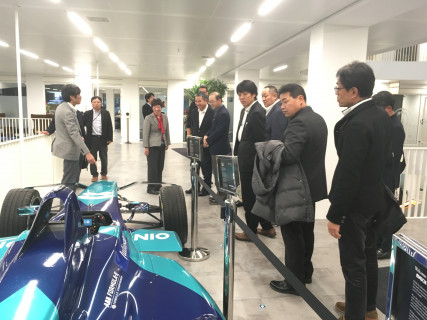ASC receives a lot of requests from international delegation interested in exchanging experiences and exploring collaboration opportunities. In this post we look back on 101 delegations we hosted from more than 20 countries in 2018.
What kind of groups visit Amsterdam Smart City and why?
Nearly half (47%) of delegations that visit Amsterdam Smart City are governmental groups and another 23% are academic. The rest are private sector (15%), press (8%) and public-private groups (5%). Most groups visit in hopes of meeting with relevant experts and stakeholders and learning from best practices. Another reason for visiting is to connect to innovative organizations and startups and to explore possibilities for collaboration. About 25% of delegations came from South Korea where the concept of smart or “ubiquitous” city originates. Other delegations come most often from USA, Japan, Germany, Finland, Denmark, Taiwan and UK.
Here are the top 10 things delegations tell us they find most inspiring about visiting Amsterdam:
1. Innovative area development — Amsterdam has a long history of innovative area development, with the Canal Belt from the 1600’s as one of the world’s most famous master plans. This culture of innovation is thriving in Amsterdam, with districts such as Circular Buiksloterham and climate-neutral Houthavens providing inspiration and best practices for master planning new city districts or transforming post-industrial areas.
2. Smart and innovative mobility solutions – While most are aware of Amsterdam’s position as a leading cycling city, many are surprised to discover Amsterdam is also a leader in electric and shared mobility. This can be seen in the form of Tesla taxis and electric buses across the city, as well as more than 2,000 electric vehicle-charging stations installed in public space. What is often most inspiring for groups is to learn that these approaches are not at all new - Amsterdam launched its first electric car-sharing system in 1974!
3. Johan Cruijff Innovation Area – Home of Ajax football club, Johan Cruijff Arena is one of the most innovative stadiums in the world. Instead of depending on diesel, the Arena constructed a micro-grid which provides uninterrupted power supply during events. It uses second life Nissan-fuel cells which store the renewable energy generated by its PV panels. The Arena is also a testing ground for innovative mobility, digital connectivity, crowd management and fan experience projects.
4. De Ceuvel Living Lab — A former shipyard now converted into a small office park for creative companies, De Ceuvel launched Jouliette, Amsterdam’s first block chain project for energy. In collaboration with CITI-XL, De Ceuvel also makes it possible for international delegations to test their technologies. Lora-enabled smart water meters from South Korea are currently being tested on the site.
5. Circl Pavilion — The Dutch government has laid out an ambitious plan to transition to a fully circular economy by 2050. Circl, a new circular building in Amsterdam’s Zuidas district offers some insight into achieve this goal. An initiative of ABN AMRO, the pavilion showcases new circular construction methods and business models. Almost all of the materials used in creating Circl are second-hand or are easily disassembled for reuse. For many delegations, Circl inspires and stimulates discussion about the transition to a circular economy.
6. Amsterdam is an ethical and responsible digital city — Digital connectivity and digital transformation are “buzz-terms” of interest for most visiting delegations. Many groups are initially disappointed to find out that Amsterdam is not the most advanced city when it comes to connected sensors, cameras and IoT devices. Instead, the focus is on the principles and values necessary to become an ethical and responsible digital city. This is best illustrated in the ‘Tada – data disclosed’ manifesto where six principles were spelled out for ensuring Amsterdam’s transition to a digital society which benefits everyone. Amsterdam also teamed up with Barcelona and New York to launch the Cities Coalition for Digital Rights, laying out five key points regarding universal Internet access; privacy, data protections and security; transparency and accountability; participatory democracy; and open and ethical digital standards. Other cities are welcome to join!
7. Vibrant startups and innovation ecosystems — Visits to hubs such as B Amsterdam, TQ and Startup Village make it possible to experience Amsterdam’s thriving startup ecosystem first hand. But, what’s most inspiring for professionals working with startups on a daily basis is Amsterdam’s approach to inviting startups to help solve urban challenges through the city’s Startup in Residence program. Now in its fourth year, the program has expanded to other Dutch municipalities and ministries.
8. Amsterdam’s approach to open engagement and dialogue — Among the highlights for many delegations is the opportunity to join open events like those hosted by Pakhuis de Zwijger, Waag Society or DataLab, where various stakeholders come together to discuss and co-create solutions to urban challenges. All of this in-person interaction is matched with the opportunity to engage online via various community engagement, participatory budgeting, and crowd funding platforms such as Voor je Buurt, West Begroot, Gebied Online, Argu and Amsterdam Smart City’s very own platform of over 6,000 members!
9. Abundance of bottom-up and community initiatives – Amsterdam’s rich ecosystem of bottom-up and community lead initiatives is according to many experts the very reason why Amsterdam was named Europe’s Innovation Capital (iCapital) in 2016. Delegations are often inspired by these initiatives, be it neighbourhood lead worm-composting or off-grid urban-farm cafes. The Amsterdammers, Make your City contest and the We Make The City innovation festival are great examples of Amsterdam's commitment to further strengthening bottom-up initiatives.
10. Innovating through public-private-partnerships (PPP’s) – More than any specific project or technology, delegations are most impressed by Amsterdam’s approach to innovation through public-private partnership and community platforms. As neither a governmental organization nor a company, Amsterdam Smart City brings together public private partners and stakeholders motivated to work on the city of the future. Governmental delegations especially divulge that they struggle to find private sector partners who are committed to collaborating, and they are curious about Amsterdam's "secrets" to working in this way.
***Are you involved in an innovative project in Amsterdam or the metropolitan Area which you would like to showcase to national and international delegations in 2019?
Share your ideas and suggestions in the comments section below or send an email to cornelia@amsterdamsmartcity.com.***





